The CMA exam can be a nail-biter, and it’s natural to feel a bit anxious about the whole process. I decided to tap our community of CMA candidates to learn:
What are your biggest fears about the CMA exam?
Their responses may be useful to help you feel not quite so alone. I’ll also provide some guidance on how you can keep these fears from undermining your progress.
Want to watch this? Check out the video format on my YouTube channel.
Just for fun, I’ll go backwards and countdown to the number one CMA exam fear people like you shared with me.
- Fear #5: Not Understanding the CMA Content Well Enough
- Fear #4: Not Motivated Enough to Pass the CMA Exam
- Fear #3: Lack of Confidence in Passing the CMA Exam
- Fear #2: Not Enough Time to Study for the CMA Exam
- Fear #1: Failing the CMA Exam
- CMA Exam Stress Management Strategy
Originally published on April 9th, 2021, this post was updated and republished on May 3rd, 2024.
Fear #5: Not Understanding the CMA Content Well Enough
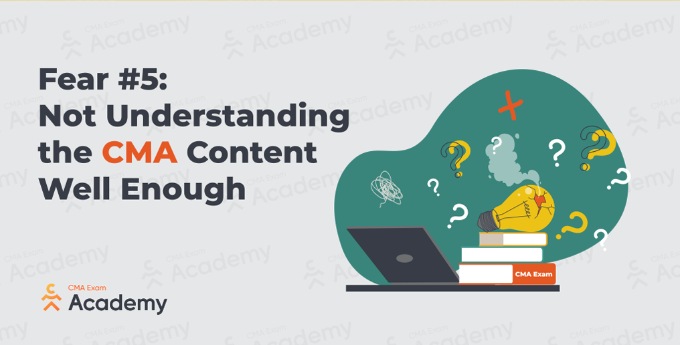
It is no secret that parts one and two of the CMA exam are chock-full of complex topics. Not only will you have to memorize facts and figures, but you will also need to learn concepts and processes which you can apply in real-world scenarios.
Passing the exam requires a high level of understanding, and you can’t achieve this in a couple of short weeks, or even a couple of months, of study. It’s a fair concern, but you shouldn’t be scared.
Here’s what I recommend to counter this fear:
- Be prepared: pick the right CMA course.
- Set a study schedule and stick to it, which will help you with progressive achievements and milestones.
- Take practice tests to get a feel for how you would score on the real thing.
- Reach out for help, either to a CMA tutor, coach, or community to ensure you’ve got the support you need to succeed.
If you get serious about studying, you can learn enough to pass the CMA exam.
Fear #4: Not Motivated Enough to Pass the CMA Exam
People who want to become CMAs are typically ambitious. After all, CMA careers are usually high-paying, high-powered and high-profile positions. We’re talking C-suite, executive-level jobs. You don’t get to that level by wanting it a little bit: you have to want it a lot.
All that to say, the fear of not being able to sustain this motivation makes sense. And in response, I’ll say this: you need to break your macro-goals down into micro-goals.
You may have your eyes on a CFO or controller position, but if passing the CMA exam is a step to getting there, you can focus your energies in one place. This will effectively conserve your energy and ensure that you fuel the right efforts.
Ultimately, you don’t change your life or crush your goals in a day. You do so through meaningful, incremental steps.
Fear #3: Lack of Confidence in Passing the CMA Exam
This answer was reported back to me by many people who don’t speak English as a first language. The world is more open than ever, with very few borders on who can or can’t gain entry to great accounting jobs.
That said, many people feel that the world of Certified Management Accounting, at least in the exam phase, still caters to native English speakers.
A second reason for lack of confidence people told me is related to test-taking skills. Not everyone is a great test-taker, and the CMA exam consists of two lengthy tests. Both of these fears can be offset by this reminder: you can overcome anything. This journey does not have to be fast, and consistency will pay off.
Mastering language skills and bolstering test-taking skills are both simple, skill-building activities. There are plenty of tactics to learn new things, and if you want to become a CMA, your career will be full of opportunities to do so.
Why not prepare those skills now, by expending effort to shore up areas of weakness? You don’t have to be afraid. You can face this fear proactively and head-on.
Fear #2: Not Enough Time to Study for the CMA Exam
This exam fear is the second most common one people talk about. My accelerated CMA Exam Academy course takes 16 weeks. And that’s accelerated. This means that, most likely, for a series of at least four months, you will have to dedicate hours a day to studying for the CMA exam.
If you currently work, have kids, have other obligations or commitments, it’s easy to see why you would be concerned about the time commitment.
Think of it this way, though: time passes either way. It passes if you are studying for the CMA exam, or it passes if you aren’t. What’s more, even if it takes a couple of years to become a full-fledged certified CMA — between the test and meeting all the CMA certification requirements — it could be the most strategic decision you make in your career.
If this is what you want to do, it’s an investment that requires a tradeoff. Similar to mustering the motivation, you simply have to decide how badly you want it. If you decide you do, go for it.
Fear #1: Failing the CMA Exam
I’m not going to sugarcoat this one: The ICMA reports a worldwide pass rate of 50% for both parts one and two of the CMA exam. While those numbers actually represent an increase from previous years, it still means that half of CMA test-takers don’t pass.
Any test at this level — including the GMAT, LSAT or MCAT — has a solid group of people who don’t make the grade. It’s because these tests are meant to narrow the playing field to the best and brightest.
If you didn’t pass the CMA exam the first time, it doesn’t mean you aren’t great or bright, it means you didn’t study enough. It definitely does not mean you should quit or that you aren’t cut out to be a CMA.
Because of the pass rates, you won’t be stigmatized if you fail the first time: you’ll be in good company. And I strongly recommend you pick yourself up, dust yourself off, and hit the books again.
Here are some resources:
If you haven’t taken it yet, safeguard yourself by dedicating a generous amount of time to preparation, investing in the right study materials, and committing yourself to a set study schedule. For more tips on that, read How to Pass the CMA Exam in Your First Attempt.
CMA Exam Stress Management Strategy
The CMA Exam is a huge undertaking, and exam stress should not be taken lightly. While some stress can be a positive motivator, too much can feel overwhelming and be detrimental to your health.
Before that happens, I have a few mental, emotional, and practical strategies to help you effectively manage your stress around the CMA exam.
- Be Prepared: One of the most effective ways to reduce stress is to be well-prepared. Choosing the right CMA Exam study course with built-in study timelines and sticking to that schedule can help alleviate stress.
- Practice Relaxation Techniques: Deep breathing, progressive muscle relaxation, and meditation can help calm your mind and body. Practice these techniques regularly, especially before studying and before the exam.
- Positive Self-talk: Be your own cheerleader! Replace negative thoughts with positive affirmations and remind yourself of past successes. Instead of saying, “I’ll never pass this exam,” say, “I am prepared, and I will do my best.”
- Practice Healthy Habits: Prioritize your physical well-being during your study time by getting enough sleep, eating healthy foods, and taking walks during breaks. Avoid excessive caffeine and sugar, as they can contribute to anxious feelings.
- Seek Support: Talk to friends, family, or a counselor about your feelings. Sometimes, simply sharing your concerns can alleviate stress. Join study groups or seek help from a coach if you’re struggling with a specific topic.
- Stay Positive: Focus on the learning process rather than just the exam outcome. Celebrate your progress and efforts, regardless of the results.
- Take Breaks: Don’t forget to take regular breaks during study sessions to avoid burnout. Engage in activities you enjoy, like listening to music, stretching, or taking a pet for a walk.
Approach CMA Studies With No More Exam Fear
It’s human nature to have anxiety or fear about big life decisions, especially ones that hinge on your academic performance. The CMA exam is hard for a reason. If you pass it, you will be well on your way to an elite and exciting career. It’s vital to manage your stress and mental health during any intense season of life, and especially important to do so as you prepare for something that requires so much intellectual investment.
Try my 16-week Accelerator course to help alleviate your CMA exam fears!
Worried about something else entirely? Carry on the conversation by commenting below on your CMA exam fears, and I’ll help you through them!
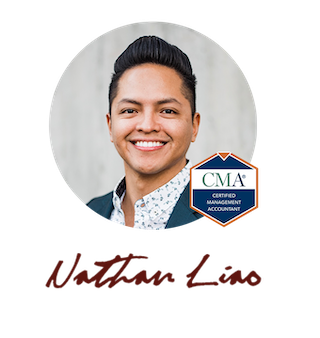
Hi, I’m Nathan Liao (aka the CMA Coach)! For the last 10 years, over 82,000 accounting and finance pros came knocking at my door seeking guidance and help. If you’re also aiming to conquer the CMA exam on your very first try—without wasting away time or money—you’ve found your ultimate guide. Dive in deeper to discover more about me and the dedicated team that powers CMA Exam Academy. Click here and let’s embark on this journey together!

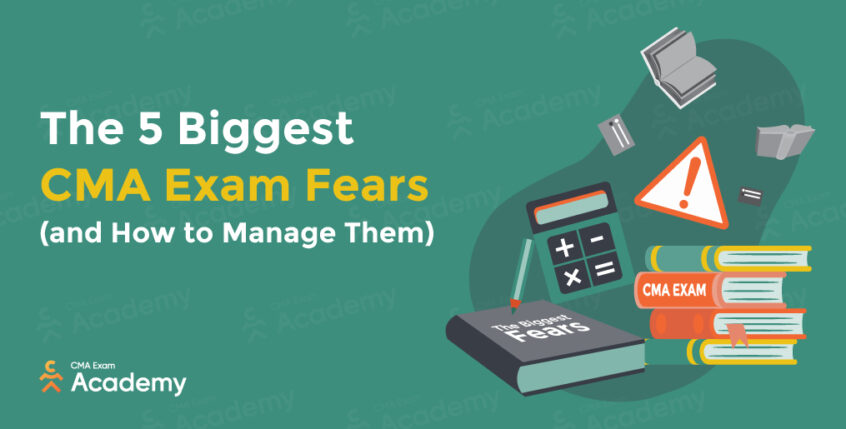
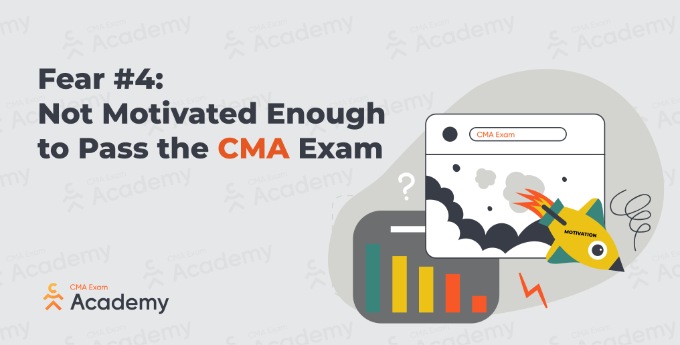
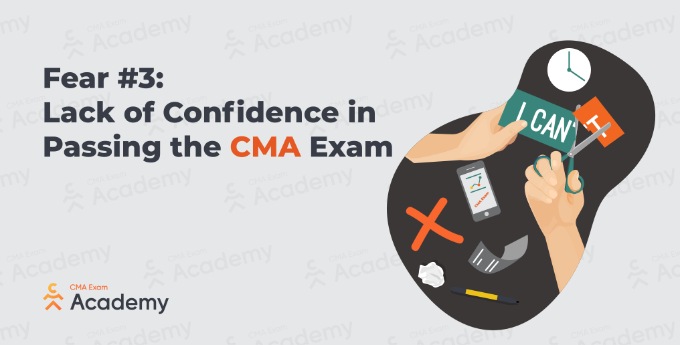
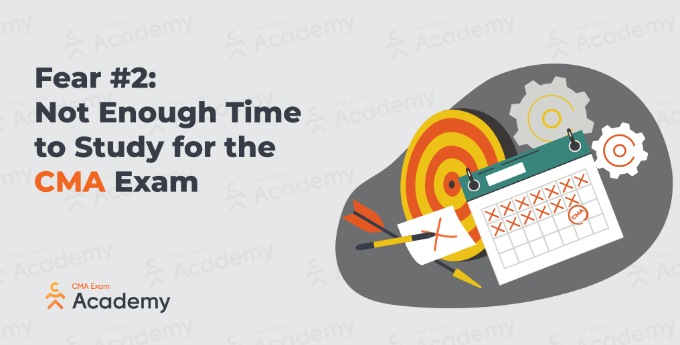
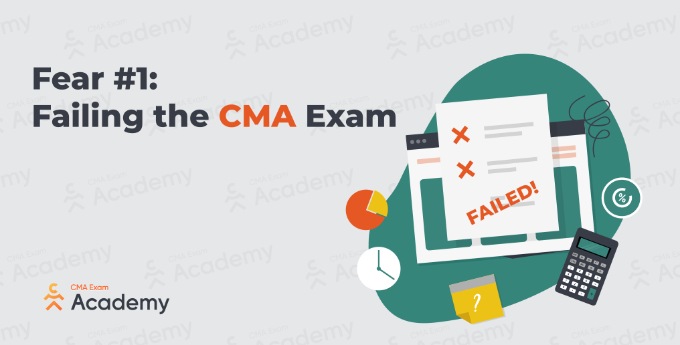
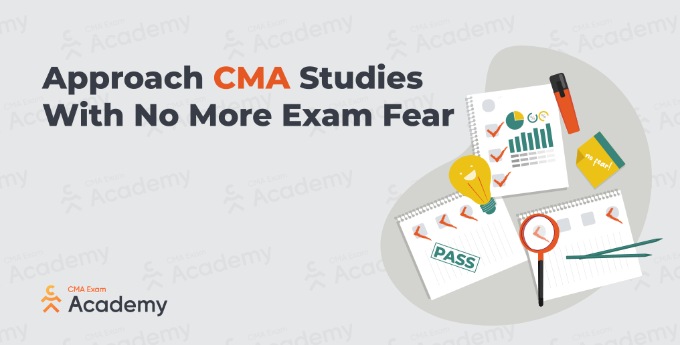
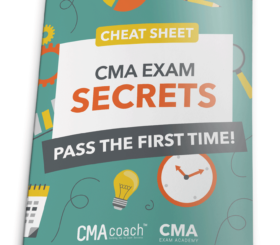
5 Comments on “The 5 Biggest CMA Exam Fears (and How to Manage Them)”
Fear #3: Lack of Confidence in Passing the CMA Exam…
I have been suffering from this fear for last 5 years.
Hi Hossaib,
You’re not alone in this; the majority of candidates feel anxious when it comes to the CMA exam, yet every year thousands of them become CMAs. If they can, then you can too.
When you follow a proven study plan like the one I offer at the CMA Exam Academy, and as you advance in your course and stay consistent with your studies, you will begin to feel more confident in your knowledge and that you can pass the exam.
Sir whether CERTIFIED MANAGEMENT ACCOUNTING AND COAST AND MANAGEMENT ACCOUNTING IS DIFFERENT OR SAME….I am studying cost and management accounting course…
They are different. Cost and Management account is course offered in India. Certified Management accountant is course offered by IMA board in USA.
Exactly, thank you, Sanjana!